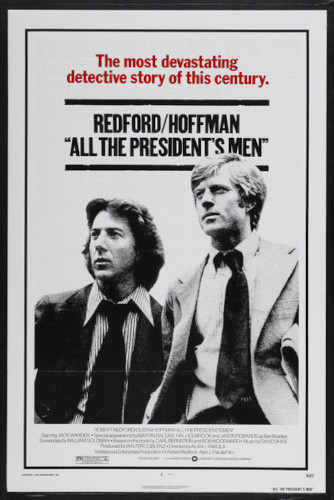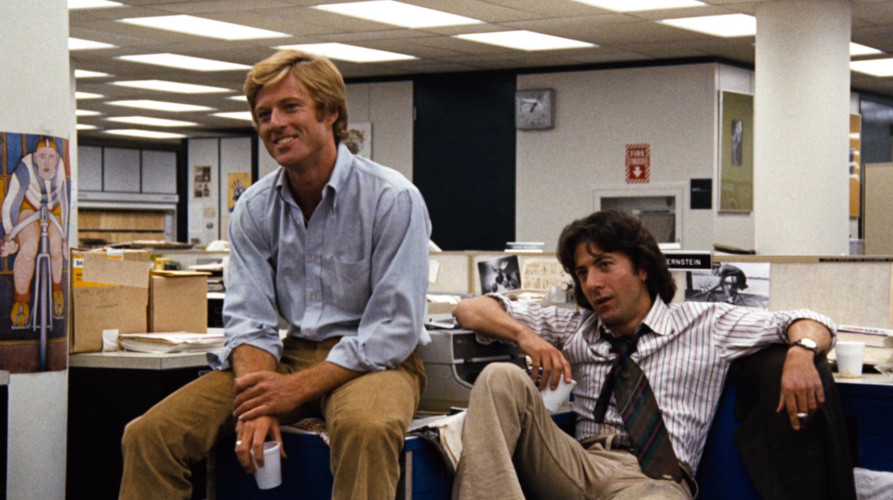All the President’s Horses and All the President’s Men
My writing style has become reasonably casual, parsed with a pompous vocabulary in pursuit of legitimacy (ha). I’ll construct essays like stories, and there’s nothing wrong with a joke every now and again. I like to think it conveys a comfortable confidence with the material, a “yeah I know this, just let me riff here for a bit”. Because generally speaking that’s true- when I’m writing paragraphs about something, you better believe I’ve made an effore to know what I’m talking about. But politics? I know politics. Movies? I KNOW MOVIES. So this class had a decent amount of writing, but it wasn’t difficult writing. I enjoyed this class.

All The President’s Men
- One of the strengths of the film is the sense of realism. How did director Alan Pakula create that realistic feel?
Realism is conveyed by the careful use of disorganization. The desks in the newsroom are cluttered, there’s a bicycle wheel leaning against Bernstein’s desk. These are touches of personality that make the setting a place people actually live and work in. The portrayals are strategically imperfect; twice Woodward fumbles through being woken up by a phone call, on another he chuckles through his own scripted mistake. Characters are imperfect and occupy a real space, this lends a credibility to the reality of the story.
- Why did The Washington Post assign Woodward and Bernstein to cover the Watergate break in rather than more experienced reporters? Do you think bigger name (at the time) journalists would have gotten the story?
As phrased by their editor, both Woodward and Bernstein are “hungry” in a way that other reporters weren’t. Woodward had been working without achievement and stumbled upon the story in the first place, Bernstein was sitting on a network of resources but was struggling to regain professional relevance. Other more established journalists may not have been motivated to the levels of enthusiasm or creativity demonstrated by the pair in their work.
- How does Ben Bradlee, the editor of The Washington Post (played in the film by Jason Robards) compare to the other media executives that we have seen in film so far this semester? Is it important that he has a photo of President Kennedy in his office?
Bradlee is comparable to news executives across multiple portrayals in their needing to balance the sometimes conflicting demands of news departments and boardrooms. Their willingness to operate a news division is suggestive of principle, their doing so for a profit is suggestive of their willingness to compromise that principle. Politically, their allegiance to profit drives a neutrality designed to avoid alienating connections they depend on. That Bradlee has a photo of John Kennedy is a distinction, an indication that to this executive, the message mattered as much as the money.
- Why is the watchdog role of the media so important? Why is it so challenging for journalists to find out what has happened inside of government?
Secrecy makes possible any number of corruptions, and the government has great power to decide what is or is not secret. The oversight provided by investigative journalism is an encouragement for government to not push the boundaries too far for the very real risk of being found out and exposed. The media is also a mechanism for informing an electorate that has a vested interest in knowing how their interests are being represented. This is countered by the government’s vested interest in maintaining control through the control of information. Levels of classification each present different barriers; protocol called for the White House to be advised in advance of publications. Reporters embedded in the heart of Washington politics will always be on the outside looking in.
- Fear is dealt with on a number of levels in the film; staff members from the Committee to Reelect the President (CREEP) are afraid to tell their stories, Woodward and Bernstein are afraid that they are being watched etc. Discuss how fear is portrayed in the film.
The actions of the actors on screen convey a felt sense of fear on their parts. Sometimes characters say outright that they’re being watched, or are afraid they’re being watched. Bernstein looks over his shoulder as he talks to his FBI contact, Woodward runs from the camera as if running from a pursuer after his interrupted meet with Deep Throat. The music becomes more tense, characters break a sweat and begin to stutter. The fear that is being applied by the government to control the people is presented as a tangible and powerful thing.
- Who was Edwin Muskie? Why is he important to the plot of the film? What was the “Canuck letter and how did that relate to the 1972 Presidential election?
Using only the cues in the film, Edwin Muskie was an early contender to challenge Nixon for the Presidency. To preclude that challenge, a letter was written by the deputy director of White House communications for the purpose of smearing Muskie’s credibility and damaging his candidacy. This was an example of the dirty tricks employed by the Nixon campaign, and of their significance to the election- that Nixon’s officers were instrumental in the shaping of an opposition candidacy that would be favorable to them in ’72.
- How do Woodward and Bernstein discover the details of the story? Do you think that they are ever too aggressive in pursuing the story?
The details behind the Watergate break-in came to light through the journalistic legwork of Woodward and Bernstein. Looking at phone records, conducting interviews, comparing notes and making reasonable inferences. They are creative, using rhetorical stunts to overcome differences in principle, or to elucidate admissions from interviewees. They take turns leading each other, with one acting as devil’s advocate to the other’s thoughts. Their determination presses occasionally too far, as when their rush to publish leads to an errant confirmation of Mr Haldeman’s involvement.
- Were you at all shocked by the activities of people working for CREEP? Why is it important to understand that the cover-up of the break-in was really an effort to hide a long-term pattern of activities designed to help Nixon’s reelection?
I was not shocked by the activities, having ironically been conditioned by events like Watergate to suspect the actions of government, but I was impressed by their sophistication. Before computers and cellphones and nationwide data networks, the Committee to Re-Elect was able to guide and influence the outcome of the election over the course of months. Connecting the break-in at the DNC to the events of the year before provides a context of scale for the audience. The stunts they’ve uncovered are worthy of the prosecutions and resignations we know would follow.
- Richard Nixon once claimed: “If the president does it, that means it is not illegal.” How does this relate to Watergate and the Nixon presidency?
The statement is an expression of arrogance by Nixon. The current Trump administration has offered anew the argument that the person in charge of directing the conformance with law is by definition a source of that law. While the office does confer certain protections on whomever is sitting in that office, the immunity presumed by both Nixon and Trump is greater than actual. As demonstrated by the multiple convictions, there was a pervasive assumption throughout Nixon’s administration that the president’s actions were above legal reproach.
- How did Watergate influence media and society today?
Watergate was part of a time that saw a substantial shift of popular trust in government. Taken along with the release of the Pentagon Papers and the exposure of corruptions overseas, government in the United States lost the benefit of the doubt. Watergate is representative of what’s possible when power is permitted to act unchecked. The word itself has become a reminder (insert George W “fool me once” joke) to approach the actions of governance with suspicion.

- How are the characters of Woodward and Bernstein portrayed in the film? Are they likeable?
Robert Redford was Hollywood’s gold standard for boyish charm, for decades. I can’t imagine the horrible things producers could have endorsed with that hapless grin if he’d ever been cast as a ruthless villain (Winter Soldier doesn’t count). The appeal of Dustin Hoffman is something I’ve never understood, but Mrs Robinson had an eye for it in The Graduate, and the Republican strategist’s ex sees something she likes in this film. Both play themselves on screen here. They’re charming, they’re pleasant, they’re not horribly disfigured, you want them to succeed as much because of their cause as of who they are.
- What does the term follow the money mean? Do you think that money is too influential in politics today? In 1972?
In backtracking the run-up to an event back to its source, the financial trail is telling. Whoever it is that’s paying the bills is the one generally most interested in the outcome of those services. As to influence of financial trails over policy, my personal argument is that the cat’s out of the bag and extricating money from politics is no longer reasonable nor practical. The greater problem is not that money has too much influence, it’s that the electorate has permitted reason to have too little influence. What’s needed is an understanding of how best money can/should be used as a political tool, as that level of awareness was as absent in 1972 as it is today.
- Does the film work for you if you don’t know the details of Watergate?
Yes, speaking from the perspective of someone who didn’t know the details but found the film to be enjoyable and illuminating regardless. I knew of the break-in and of Nixon’s eventual fall, but I was never entirely clear as to how the pieces related. While I’m sure the film conveyed only a portion of the event’s complexity, I was still able to understand the context of what was going on through the reporters’ discovery of it.
- How does the film illustrate the importance of a free press for a Democracy?
Thomas Jefferson wrote frequently about the importance of an informed electorate (and the risk of an ignorant one) to the health of the Republic. It was a duty, to Jefferson, to know what was going on, to be always learning. For that to happen, there needs to be someone to teach, someone to provide information that needs to be known. As far as practice has uncovered so far, a free press has been the most effective mechanism towards that end. With a mission to inquire and educate, they can be free from partisan boundaries that would seek to quarantine information and power along ideological lines. The work of Woodward and Bernstein to pierce that ideological veil and illuminate the pattern of wrongdoing within the Nixon administration is a case study of these virtues. Absent a free press, their big scoop would have died with the first press office denial, and Nixon’s accumulation of power would have lasted through the term.